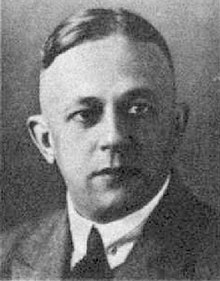Bruno Schneider (politician)
Bruno Schneider (born March 17, 1886 in St. Petersburg , † around 1969/1970 in Starnberg ) was a German politician (DNVP).
Live and act
Origin and early years
Schneider was born in St. Petersburg as one of eight children of Heinrich Schneider and his wife, a Swede. As director of the Skorochod shoe factory, the largest shoe factory in Europe at the time, his father had achieved great prosperity. Before the First World War he was an Imperial Russian Councilor of Commerce and a multimillionaire.
In his childhood, Schneider received private lessons. In 1897 he was sent to Erfurt , where he attended the secondary school. After graduating from high school, Schneider studied law at the Universities of Göttingen (1904–1906), Munich (1904–1907) and Halle an der Saale (1906–1907). He passed his first state examination in 1907, the second followed in 1914. 1911 doctorate in Göttingen Schneider to Dr. jur. In 1912 he married. Around 1912 he was a member of the 1st Leib-Hussar Regiment No. 1 in Danzig, where he met the last Prussian and Imperial German Crown Prince Wilhelm .
In 1914 Schneider planned to embark for Buenos Aires as a representative of North German Lloyd . The trip did not take place due to the beginning of the First World War. Instead, he was reactivated as a reserve officer, and on July 31, 1914, he again joined the Leibhusars. He then took part in the war from 1914 to 1918 with the Leib-Hussar Regiment No. 1 and the Landwehr Infantry Regiment No. 21. He was used on the Eastern Front and u. a. used as an adjutant to a battalion commander. During the war Schneider was awarded the Iron Cross of both classes and promoted to lieutenant.
Weimar Republic and the time of National Socialism
After the war Schneider settled down as a lawyer in Erfurt.
Schneider was politically active in the German National People's Party . For this he sat from December 1924 to May 1928 as a member of the German Reichstag , in which he represented constituency 12 (Thuringia).
The Great Depression caused Schneider's bourgeois existence to collapse in 1931. He then moved to Berlin with his family.
In 1943 he was called up as captain of the reserve to the Wehrmacht command staff and then used as captain in a branch of the OKW in Potsdam.
post war period
In 1945 Schneider was arrested by the US Army in Schongau and, due to his position within the German army, placed in " automatic arrest ".
In the last years of his life, Schneider lived in the house of his daughter and son-in-law. There he wrote his memoirs around 1962, which remained unpublished.
Schneider's son identified him in a short biographical sketch as a man who was "a rather interesting person with a typical, namely rather sad life", who was, although "clever, highly educated, [and] with a sense of humor". The father fell “in the middle of his life” and then fate “hailed” every attempt to turn his talents into success.
family
Schneider was married. The marriage resulted in two sons and two daughters. The older son (* around 1917) died of suicide around 1933. The younger son Wolf Schneider (* 1925) became known in the post-war period as a journalist and director of the Henri Nannen School .
Fonts
- Peaceful effect and property in the market and town . Heidelberg 1913 (also published as a dissertation in Göttingen 1911).
literature
- Wolf Schneider: A father. Portrait of a Failed. In: Ders .: Hottentottenstottertrottel. My long, whimsical life . Rowohlt, Reinbek 2015, ISBN 978-3-498-06435-8 , pp. 414-421 (Chapter 43).
Web links
- Literature by and about Bruno Schneider in the catalog of the German National Library
- Bruno Schneider in the database of members of the Reichstag
- Bruno Schneider in the online version of the Reich Chancellery Edition Files. Weimar Republic
Individual evidence
- ↑ a b Wolf Schneider: Hottentottenstottertrottel. My long, whimsical life . Rowohlt, Reinbek 2015, p. 415.
- ↑ a b Wolf Schneider: Hottentottenstottertrottel. My long, whimsical life. Rowohlt, Reinbek 2015, p. 418.
| personal data | |
|---|---|
| SURNAME | Schneider, Bruno |
| BRIEF DESCRIPTION | German politician (DNVP), MdR |
| DATE OF BIRTH | March 17, 1886 |
| PLACE OF BIRTH | St. Petersburg |
| DATE OF DEATH | around 1968 |
